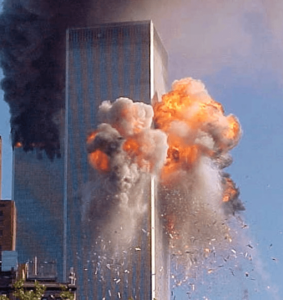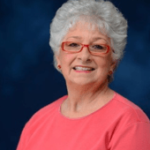Headlines
Bonnie Brown: 9/11 Memorials Offer Solace to Remembrance of an American Tragedy
Growing up, I often heard people speak about where they were when President Kennedy was shot. It was a defining memory for my generation.
Many years later, a different generation talked about where they were on 9/11. That’s the way we refer to it, as numbers. There’s lots more numbers associated with this act of terrorism: 2,753 people were killed in New York, 184 at the Pentagon, and 40 outside Shanksville, Pennsylvania. More than 6,000 people were injured, and at least 1,000 more have died—and many more are sick–from debris consisting of asbestos, lead, glass, heavy metals, concrete, poisonous gases, oil and other dangerous substances that mixed with exploding jet fuel from the World Trade Center.

Photo: AP Wide World Photos.
Sept. 11, 2001, was a terrorist attack by al-Qaeda, on our homeland, on American soil. Throughout history, there have been many other acts of terrorism. Think the Unabomber (1978-1995), 1993 World Trade Center bombing, Oklahoma City bombing of the Alfred P. Murrah Federal Building in 1995, 1996 bomb in Centennial Olympic Park in Atlanta and the Boston Marathon bombing in 2013.
I don’t get it. I don’t understand terrorism and violence and war. I don’t know what the objective is. I could understand if you have to use violence to secure food and water for your very survival. According to Paul Goodman, a freelance writer originally from England but now living in Florida, there are eight main reasons for war: economic gain, territorial gain, religion, nationalism, revenge, civil war, revolutionary war, and defensive war. Can ANY of these reasons justify the deaths and destruction that war brings?
Back to Kennedy’s assassination in November 1963. I was in seventh-grade math class. Our teacher, Mr. Webb, answered a knock on the classroom door, conferred with someone for a few minutes, then turned to the class, obviously shaken, told us that President Kennedy had been shot, and suspended teaching for the remainder of the class period. We sat there in stunned silence. What did that mean? It was news that was so unthinkable. It just couldn’t be true.
That’s the same way I felt when on Sept. 11, 2001, in my office on campus in Martindale in the Registrar’s Office I got a phone call saying that there were reports that a plane had crashed into the World Trade Center. How awful! I imagined the plane must have experienced mechanical failure, a freak accident, for that to have occurred. Shortly afterwards, the second plane crashed. The news coming in affected everyone in the office. We were startled, we were frightened. What could this mean? What had happened? By the time we were being told that America was under attack came the news about the plane, American Airlines Flight 77, that had crashed into the west side of The Pentagon at 9:45 a.m. We were stunned.
By this time, there was a television on in the building and people were gathered around watching in horror as the news outlets were reporting on these tragedies. The receptionist, my colleague Annie Hollowell, was nearly inconsolable because she and her husband had friends assigned to The Pentagon. It was too horrible to imagine how this could be happening. Unlike my seventh-grade self at the time of the Kennedy assassination, I was digesting this horrific news as an adult and trying to get a grip on the reality of what was happening. We were in shock, but we were also trying to conduct the business of serving students who were coming by to pick up a transcript, ask questions about a grade/class, a multitude of things. They were mostly unaware of what was happening and the gravity of what was occurring hadn’t really touched them yet.

Photo: Reuters/Ethan Miller/Newscom.
What happened in the hours and days to follow was something I’ll never forget. I always like to keep close tabs on my family but I was obsessive about where they were, what they were doing. I wanted more than ever to keep my loved ones close to me, to protect them, to shield them from the awfulness that seem to hang in the very air we were breathing. I wasn’t alone. I truly think that every American brought their family circle close and held them tight. There was a marked difference even in the number of people eating out, going out. “Home” is where everyone wanted to be, to feel safe and protected. There was a definite feeling of patriotism. American flags appeared everywhere. Even as we came to terms with what had happened, our resolve that it never happen again was strong.
Now after all these years, I still shudder when I see images of those planes flying into the World Trade Center, or see images of the massive amount of debris, and pictures of first responders hurrying to help. It was a very dark day.
The memorials that have been erected to commemorate this tragic day offer some solace to all of us. The phrase “Never Forget” stayed with us. I hear it still and see reminders often.
How could we forget? This day, this number 9/11 changed our way of life forever. Never forget, but do look forward. Look forward with hope that wars and violence will one day end.
 Bonnie Brown is a retired staff member of the University of Mississippi. She most recently served as Mentoring Coordinator for the Ole Miss Women’s Council for Philanthropy.
Bonnie Brown is a retired staff member of the University of Mississippi. She most recently served as Mentoring Coordinator for the Ole Miss Women’s Council for Philanthropy.
For questions or comments, email hottytoddynews@gmail.com.






























Bettye Galloway
September 11, 2018 at 2:58 pm
Thanks, Bonnie. This brings back vivid memories of a sad time.
Bonnie Brown
September 11, 2018 at 9:08 pm
Sad time for sure. Still hard to grasp that it really happened.